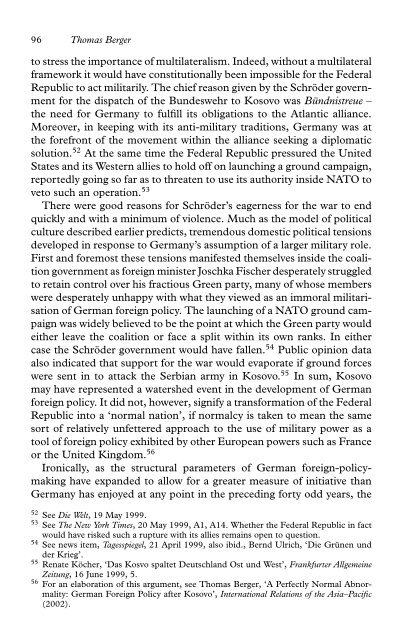Memory and Power in Post-War Europe: Studies in the Presence of ...
Memory and Power in Post-War Europe: Studies in the Presence of ...
Memory and Power in Post-War Europe: Studies in the Presence of ...
You also want an ePaper? Increase the reach of your titles
YUMPU automatically turns print PDFs into web optimized ePapers that Google loves.
96 Thomas Berger<br />
to stress <strong>the</strong> importance <strong>of</strong> multilateralism. Indeed, without a multilateral<br />
framework it would have constitutionally been impossible for <strong>the</strong> Federal<br />
Republic to act militarily. The chief reason given by <strong>the</strong> Schröder government<br />
for <strong>the</strong> dispatch <strong>of</strong> <strong>the</strong> Bundeswehr to Kosovo was Bündnistreue –<br />
<strong>the</strong> need for Germany to fulfill its obligations to <strong>the</strong> Atlantic alliance.<br />
Moreover, <strong>in</strong> keep<strong>in</strong>g with its anti-military traditions, Germany was at<br />
<strong>the</strong> forefront <strong>of</strong> <strong>the</strong> movement with<strong>in</strong> <strong>the</strong> alliance seek<strong>in</strong>g a diplomatic<br />
solution. 52 At <strong>the</strong> same time <strong>the</strong> Federal Republic pressured <strong>the</strong> United<br />
States <strong>and</strong> its Western allies to hold <strong>of</strong>f on launch<strong>in</strong>g a ground campaign,<br />
reportedly go<strong>in</strong>g so far as to threaten to use its authority <strong>in</strong>side NATO to<br />
veto such an operation. 53<br />
There were good reasons for Schröder’s eagerness for <strong>the</strong> war to end<br />
quickly <strong>and</strong> with a m<strong>in</strong>imum <strong>of</strong> violence. Much as <strong>the</strong> model <strong>of</strong> political<br />
culture described earlier predicts, tremendous domestic political tensions<br />
developed <strong>in</strong> response to Germany’s assumption <strong>of</strong> a larger military role.<br />
First <strong>and</strong> foremost <strong>the</strong>se tensions manifested <strong>the</strong>mselves <strong>in</strong>side <strong>the</strong> coalition<br />
government as foreign m<strong>in</strong>ister Joschka Fischer desperately struggled<br />
to reta<strong>in</strong> control over his fractious Green party, many <strong>of</strong> whose members<br />
were desperately unhappy with what <strong>the</strong>y viewed as an immoral militarisation<br />
<strong>of</strong> German foreign policy. The launch<strong>in</strong>g <strong>of</strong> a NATO ground campaign<br />
was widely believed to be <strong>the</strong> po<strong>in</strong>t at which <strong>the</strong> Green party would<br />
ei<strong>the</strong>r leave <strong>the</strong> coalition or face a split with<strong>in</strong> its own ranks. In ei<strong>the</strong>r<br />
case <strong>the</strong> Schröder government would have fallen. 54 Public op<strong>in</strong>ion data<br />
also <strong>in</strong>dicated that support for <strong>the</strong> war would evaporate if ground forces<br />
were sent <strong>in</strong> to attack <strong>the</strong> Serbian army <strong>in</strong> Kosovo. 55 In sum, Kosovo<br />
may have represented a watershed event <strong>in</strong> <strong>the</strong> development <strong>of</strong> German<br />
foreign policy. It did not, however, signify a transformation <strong>of</strong> <strong>the</strong> Federal<br />
Republic <strong>in</strong>to a ‘normal nation’, if normalcy is taken to mean <strong>the</strong> same<br />
sort <strong>of</strong> relatively unfettered approach to <strong>the</strong> use <strong>of</strong> military power as a<br />
tool <strong>of</strong> foreign policy exhibited by o<strong>the</strong>r <strong>Europe</strong>an powers such as France<br />
or <strong>the</strong> United K<strong>in</strong>gdom. 56<br />
Ironically, as <strong>the</strong> structural parameters <strong>of</strong> German foreign-policymak<strong>in</strong>g<br />
have exp<strong>and</strong>ed to allow for a greater measure <strong>of</strong> <strong>in</strong>itiative than<br />
Germany has enjoyed at any po<strong>in</strong>t <strong>in</strong> <strong>the</strong> preced<strong>in</strong>g forty odd years, <strong>the</strong><br />
52 See Die Welt, 19 May 1999.<br />
53 See The New York Times, 20 May 1999, A1, A14. Whe<strong>the</strong>r <strong>the</strong> Federal Republic <strong>in</strong> fact<br />
would have risked such a rupture with its allies rema<strong>in</strong>s open to question.<br />
54 See news item, Tagesspiegel, 21 April 1999, also ibid., Bernd Ulrich, ‘Die Grünen und<br />
der Krieg’.<br />
55 Renate Köcher, ‘Das Kosvo spaltet Deutschl<strong>and</strong> Ost und West’, Frankfurter Allgeme<strong>in</strong>e<br />
Zeitung, 16 June 1999, 5.<br />
56 For an elaboration <strong>of</strong> this argument, see Thomas Berger, ‘A Perfectly Normal Abnormality:<br />
German Foreign Policy after Kosovo’, International Relations <strong>of</strong> <strong>the</strong> Asia–Pacific<br />
(2002).
















